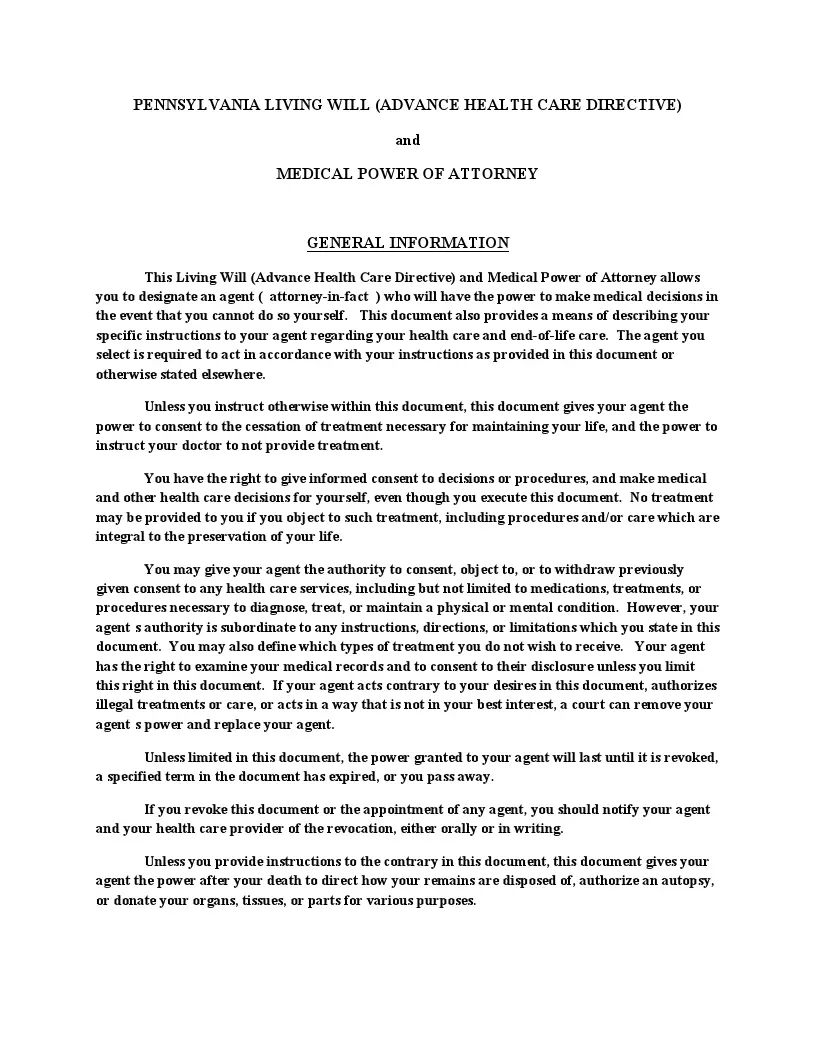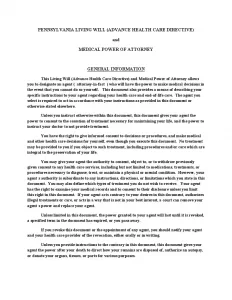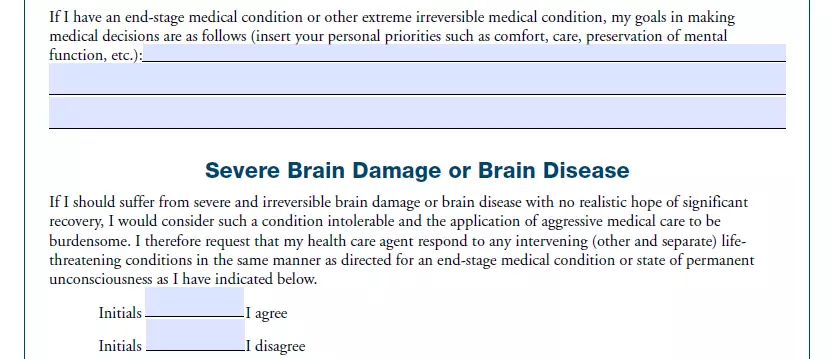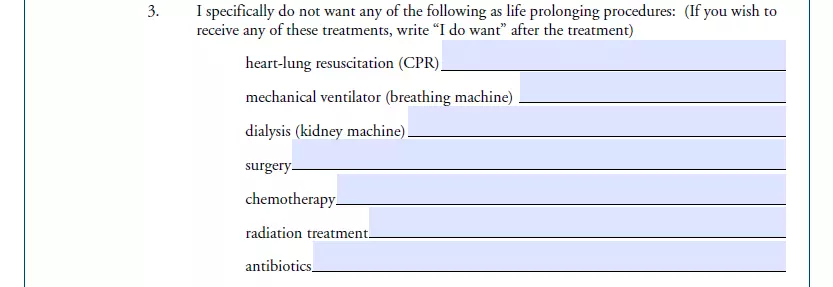Free Pennsylvania Living Will Form
The Pennsylvania Living Will is part of the Advance Directive, which defines the principal’s wishes regarding life-sustaining treatments or end-of-life healthcare when one cannot express or render therapeutic care choices independently.
In Pennsylvania, the living will form is usually combined with the Health Care Power of Attorney document, where the principal (or the declarant) elects an agent who will make medical choices on the principal’s behalf, which is defined by Chapter 54 Subchapter C (§5451 to 5465).
In Pennsylvania, the declarant chooses the relevant medical measures and defines his or her preferences in the Living Will. According to Part III of the Pennsylvania Advance Directive, the patient provides an agreement to or refusal of the following measures:
- Medical therapy to relieve pain and provide comfort, though such medical strategies may cause habit-forming, difficulty of respiration, or shorten life.
- Life-prolonging practices, including Cardiopulmonary Resuscitation (CPR), defibrillation, artificial ventilation, dialysis, surgery, chemotherapy, radiation treatment, and antibiotics.
- Pennsylvania Living Will form allows the patient to indicate whether one agrees to tube feeding, which comprises artificial nutrition and hydration.
- Making organ gifts
- Instruct and grant access to a health care agent to execute the principal’s wishes.
Following Chapter 45 Subchapter B §5443, the Living Will is operative when an attending physician states that the patient is incompetent and incapable to express his or her wishes for oneself orally or in written form, the patient is permanently unconscious and has an end-stage life condition. A copy of the Living Will must be given to the attending physician.

Build Your Document
Answer a few simple questions to make your document in minutes
Save and Print
Save progress and finish on any device, download and print anytime
Sign and Use
Your valid, lawyer-approved document is ready
Who can create a Living Will?
An individual is empowered to create a living will if:
- the principal is at least 18 years old;
- the principal is a high school graduate;
- a married person or an emancipated minor.
Signing Requirements and Laws
If a Pennsylvania resident intends to create a living will, one must consider the restrictions and requirements clarified in Chapter 45, Subchapter B §5442. Therefore, the following terms must be executed.
It is important that the principal signs the Living Will by sign or by mark. In case the declarant cannot execute the procedure on his or her own, he or she can elect a representative to sign the document on the principal’s behalf and at the principal’s direction.
A health care provider or an agent may not sign the Living Will on behalf of the principal if they carry out medical care services to the declarant.
The Living Will cannot be legal unless two witnesses, 18 years of age or older, sign the document.
The Law of Pennsylvania doesn’t oblige the principal to notarize the Living Will. However, witnessing combined with notarization makes the document valued by other states.
Pennsylvania Living Will Form Details
| Document Name | Pennsylvania Living Will Form |
| State Form Name | Pennsylvania Combined Living Will & Health Care Power of Attorney |
| Signing Requirements | Two Witnesses |
| Validity Requirements | Section 5442 |
| Specific Powers | Section 5422 |
| Avg. Time to Fill Out | 13 minutes |
| # of Fillable Fields | 48 |
| Available Formats | Adobe PDF; Microsoft Word |
| State Laws: Pennsylvania Consolidated Statutes, Title 20, Sections 5441 to 5447 | |
What Are the Revocation Terms?
The declarant can revoke the Living Will at any time, regardless of the patient’s medical condition, no matter at what mental or physical stage the principal is.
If the principal elects a spouse as an agent, the advance directive is revoked in case of divorce.
Life-sustaining treatment, artificial nutrition, and hydration shall be provided to an incompetent pregnant woman, following Chapter 45 Subchapter A §5429, ignoring the existence of a Living Will.
Once all requirements are performed, the principal can proceed to fill out the form.

Steps to Fill Out the Form
Follow the step-by-step instructions to create a document.
1. Download the Form
You are welcome to download the Advance Directive comprising both the Living Will and the Health Care Power of Attorney from our website. Read the introductory remarks to understand the details and only then start filling out the document. To make it utmostly correct, use our convenient Online Forms Building Software to fill out the Living Will form.
2. Assign a Health Care Agent
The document consists of three parts. Part II is dedicated to the election of a trusted person to designate as an agent. Read this section carefully and appoint a Health Care Agent. Spell out the agent’s name and relation, address, phone numbers, and an email.
It may happen that the appointed person will refuse to execute the principal’s wishes due to some life circumstances or beliefs. In this case, an alternative agent will be empowered to carry out the commitments. You can write down two alternatives to avoid unpredictable situations.

3. Assign Powers to Your Health Care Agent
Specify your health care agent’s instructions in a free form and choose a strategy if you should suffer from severe brain damage.

4. Choose Life-sustaining Measures
Read the introduction of Part III (Living Will) carefully and choose medical treatments that you reject. Spell out “I don’t want” after the treatment suggested in the form, including life-sustaining measures and tube feedings.

5. Specify the Priority of the Instructions
Define how closely your health care agent should follow the guidance — is the Living Will a strictly to follow instruction, or should the agent use it as a guideline to render medical decisions on your behalf.

6. Define Your Intentions Concerning Organ Donation
Specify your preferences for anatomical donation and insert limitations on the gifts if needed.

7. Provide Witnesses’ Signatures
To be fully legal, the Advance Directive must be signed by the principal, the agent, and two adult individuals at the age of 18 and older. Both witnesses sign the document in each other’s presence.
If there is a person who, due to circumstances, signs the form on behalf of the declarant, they cannot perform as one of the witnesses.
Pennsylvania law doesn’t require notarization, which is reflected in the Advance Directive form. However, if you wish to make the document more valid, you may request notary public signatures.


Check out our document builder to personalize any template available on FormsPal to your preferences. Here’s a group of some other fillable Pennsylvania forms we provide.
